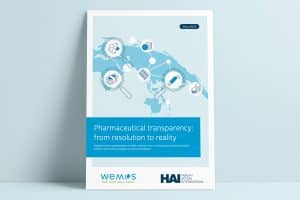
A new report by public health NGOs Wemos and Health Action International shows that most governments are lagging behind in implementing the World Health Assembly (WHA) resolution on increasing transparency in the pharmaceutical sector. The lack of action in this area hampers global access to affordable medicines and accountability for decisions that affect public health. The report highlights the steps taken in selected regions and countries to improve pharmaceutical transparency and provides recommendations.
WHA resolution for transparency
The current secrecy in the pharmaceutical sector, for example on the development costs, prices paid and profits, means that public buyers have no or insufficient information to determine a fair price for new medicines. As a result, governments often pay excessive amounts. Moreover, the lack of transparency damages public oversight and trust.
To counter this, in 2019, the member states of the World Health Organization (WHO) adopted WHA resolution 72.8, entitled ‘Improving the transparency of markets for medicines, vaccines, and other health products’. The resolution calls on governments to ensure public disclosure of net prices paid and to improve the reporting by suppliers on information that affects the pricing.
Six years later, Wemos and Health Action International have assessed to what extent countries have translated the commitments from WHA resolution 72.8 into reality. The report summarizes key developments at national, regional and global levels.
Harmful practices
While many countries are developing initiatives to increase pharmaceutical transparency, Germany and Switzerland are taking worrying steps in the opposite direction. Pushed by the pharmaceutical industry – which has a significant presence in these countries – both governments are adopting or proposing new legislation to protect and increase secrecy of the prices they pay for new medicines.
The report’s authors warn that the consequences extend beyond the country’s borders. By legislating the secrecy surrounding the prices they pay to pharmaceutical companies, the German and Swiss governments sidestep accountability for how they spend taxpayers’ money. In addition, they leave other countries without reference for their price negotiations with pharmaceutical companies.
Positive steps towards transparency
The report shows that several countries have taken positive steps to achieve pharmaceutical transparency. For example, Italy has passed legislation to enforce the disclosure of research and development (R&D) costs and the amount of public funding of R&D. France also has made disclosure of public investments in R&D mandatory by law.
Spain has established a special institutional body to enhance transparency, including on pricing and procurement of health products. In Chile, government agencies are pushing for an observatory for public oversight of medicine prices. In South Africa, the pursuit of transparency is even enshrined in the country’s constitution.
The report also shows that additional steps and political will are needed to successfully implement adopted legislation and initiatives undertaken. According to the report’s authors, it is important that other countries learn from these and other positive examples to implement effective national policies.
International collaboration
The authors of the report stress that, besides national policy, regional and international collaboration is crucial for achieving pharmaceutical transparency. The report highlights several existing alliances and platforms where countries exchange information and negotiate together, aiming to maximize their purchasing power thus lowering the prices of new medicines. These alliances should be strengthened and expanded and serve as examples for other regions of the world.
Aliénor Devalière, global health expert at Wemos: “Greater transparency in pharmaceutical markets is vital not only for public health but also for public trust and responsible government spending. Governments must step up and implement effective steps towards greater transparency, to ensure accountability, patient access to data, and ultimately fair prices.”
Jaume Vidal, policy advisor at Health Action International: “WHA resolution 72.8 marked a milestone in the quest for greater transparency in pharmaceutical markets. While progress on implementation has varied across national contexts, commitment to transparency in key aspects of pharmaceutical policy and governance must remain a priority.”
Download the report 'Pharmaceutical transparency: from resolution to reality'





